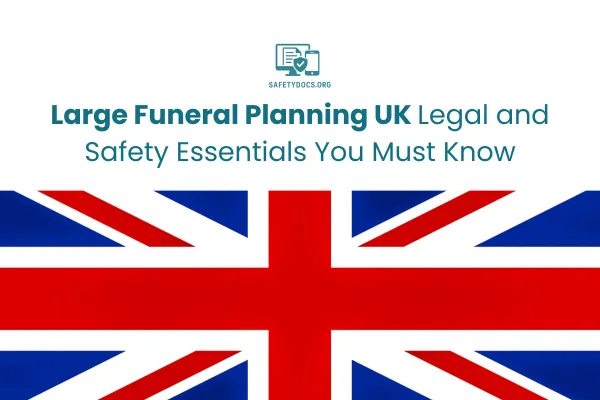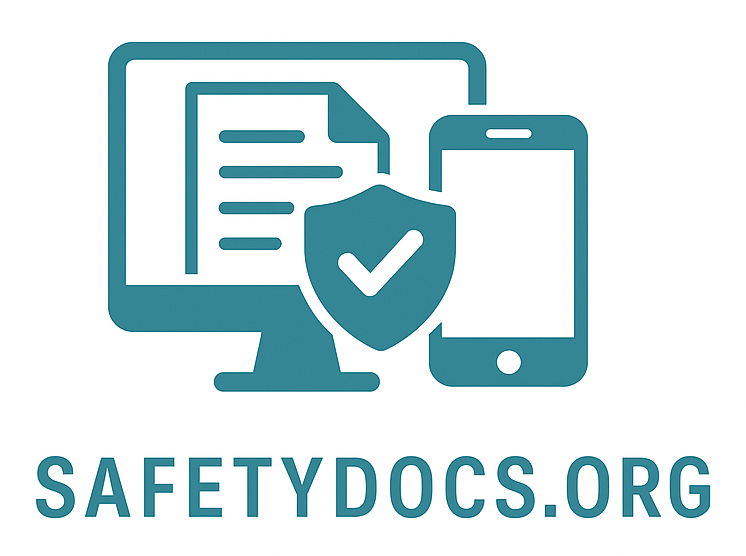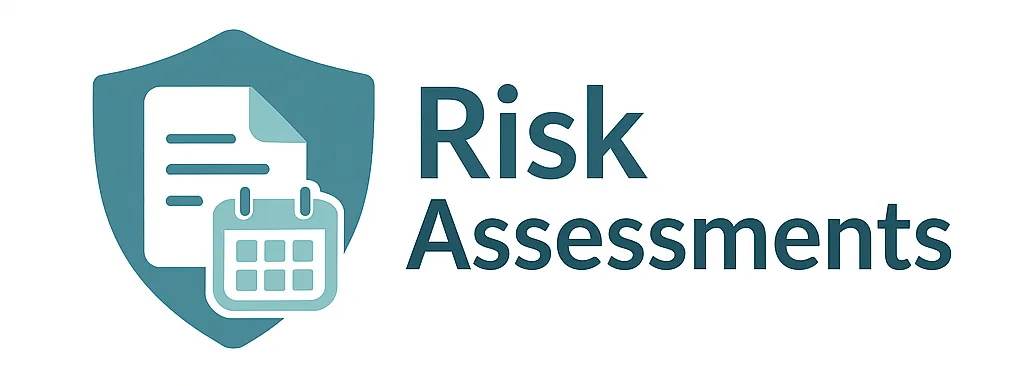
Large Funeral Planning UK: Legal Safety Guide
Planning a large funeral in the UK involves much more than managing logistics and guest lists. Families, funeral directors, and event organisers must ensure the gathering adheres to safety laws, government guidelines, and emerging security requirements. With rising attendance at funerals and increasing focus on public safety, understanding Large Funeral Planning UK is now a legal and moral responsibility.
The Act currently carves out special rules for certain venue types: Places of worship and educational institutions are always treated as “standard duty” premises, regardless of crowd size. This means even if a cathedral or school campus event hosts 1,000 people, it will not trigger the “enhanced” tier requirements – it remains under the standard duty by law. You need to fully understand if this applies to your event.
This blog breaks down the essentials of funeral safety, including Funeral event safety compliance, Martyn’s Law funeral requirements, Protect Duty UK funerals, and UK funeral safety documentation. You'll also learn how to meet funeral event legal obligations UK so your service is both respectful and fully compliant.
Why Large Funeral Events Require Special Planning
Funerals attended by hundreds sometimes thousands demand more than a typical memorial service. From crowd control to risk assessments, large gatherings raise concerns for security and public safety. Without proper planning, even well-intentioned ceremonies may inadvertently breach UK laws, potentially putting mourners at risk or leading to legal consequences.
For example, religious or cultural funerals may attract community-wide attendance, while the passing of a public figure can bring national attention. In both cases, issues like access control, road closures, and emergency services coordination come into play. These events are no longer “private affairs” but resemble organised public gatherings requiring formal planning and paperwork.
Understanding Funeral Event Safety Compliance
What Is Funeral Event Safety Compliance?
Funeral event safety compliance refers to the legal standards and health and safety checks that must be followed when organising a funeral of significant scale. These include:
Risk assessments for crowd size, traffic flow, and site safety
Emergency planning in case of medical incidents or disturbances
Venue suitability for accommodating expected attendees
Qualified personnel such as marshals, security staff, or medical responders
Proper signage, fire exits, lighting, and communication systems must also be checked. If ignored, even one oversight could create a ripple effect leading to serious consequences. Importantly, compliance doesn’t just protect attendees it safeguards the organiser from legal risk.
Martyn’s Law Funeral Requirements: What You Need to Know
Martyn’s Law funeral requirements stem from the UK government’s wider counter-terrorism strategy. Named after Martyn Hett, a victim of the Manchester Arena attack, the proposed legislation aims to improve security at publicly accessible venues including funerals by making it a legal duty to:
Conduct terror threat risk assessments
Implement clear security protocols
Train staff and volunteers on emergency response
Work with local authorities and police in advance
The law is currently progressing through parliament, but its recommendations are already being adopted by forward-thinking funeral directors and venues. Compliance will soon be compulsory for many public locations, including churches, mosques, community halls, and crematoriums.
Ignoring these recommendations could result in serious liabilities if an incident occurs even if it’s not related to terrorism. Every organiser should be aware that Martyn’s Law is not about fear it’s about responsibility.
Protect Duty UK Funerals: Future-Proofing Your Event
Protect Duty UK funerals build on the framework set out by Martyn’s Law. Rather than responding to specific threats, this duty encourages broader readiness. Large funerals may face a variety of disruptions including protests, traffic issues, or unexpected crowd behaviour.
Preparation under this duty might include:
Installing temporary CCTV or hiring qualified security
Conducting evacuation drills with venue staff
Providing disability access and assistance staff
Coordinating with police to manage traffic and road closures
You may also need a public address system to manage communication during the funeral. These requirements go beyond tradition they are part of building public trust and showing that organisers care about every mourner’s safety.
UK Funeral Safety Documentation: Keep Your Records Straight
Paperwork may feel impersonal during a time of grief, but UK funeral safety documentation is vital. It provides a clear audit trail proving the organiser has taken appropriate steps.
Key documents include:
Risk assessments tailored to the funeral's location and size
Proof of insurance and public liability coverage
Security staff licences or credentials
First aid arrangements, including ambulance access if necessary
Contracts with any third-party safety services
These documents should be stored securely and shared with relevant parties (e.g., venue managers, police liaisons). They may also be requested by local authorities before granting permits.
Meeting Funeral Event Legal Obligations UK
Your Legal Responsibilities as an Organiser
If you're planning or overseeing a large funeral, you may be legally classified as the "event organiser." This means you carry formal responsibilities for fulfilling funeral event legal obligations UK, such as:
Securing event licenses for public gatherings
Informing local councils and emergency services
Managing waste, noise, and environmental issues
Ensuring all contractors (caterers, drivers, marshals) are properly insured
Complying with GDPR if collecting or recording attendee information
These aren’t just recommendations they are statutory duties under UK law. Many organisers work with legal advisors or trained funeral directors to ensure compliance. Ignorance of the law will not protect you from liability if something goes wrong.
How Funeral Directors Are Adapting to Legal Changes
UK funeral directors have responded proactively to the evolving legal environment. The best firms are now trained in compliance matters and often include support services within their standard packages.
Services offered may include:
Health and safety site assessments
Coordination with law enforcement and emergency planners
Preparation of safety documentation
On-site presence of certified staff
Some directors even have legal advisors or in-house event managers to ensure seamless compliance. Choosing a provider that understands Martyn’s Law funeral requirements and Protect Duty UK funerals can reduce stress for the family and prevent costly oversights.
Common Mistakes to Avoid in Large Funeral Planning UK
Even with the best intentions, the following mistakes can compromise safety and legality:
1. Underestimating guest numbers: Causes overcrowding and legal breaches
2. Not informing the council or local authorities: May lead to disruptions or fines
3. Skipping risk assessments: Could void insurance and breach duty of care
4. Hiring unqualified staff: Invalidates compliance with public event safety
5. Lack of signage or guidance for attendees: Increases risk in emergencies
Avoiding these issues requires early planning, consultation, and a willingness to prioritise both safety and legality alongside emotion and tradition.
Cost Implications of Safety and Legal Compliance
Some families worry that legal planning will increase funeral costs. While there is a financial component, failing to comply could cost more in the long run due to:
Fines
Civil claims
Event cancellations
Negative media attention
That said, there are practical ways to manage cost:
Work with venues that include risk planning in their hire fee
Share costs with community sponsors or religious bodies
Use recommended service providers who offer bundled compliance support
Many councils also offer guidance or partial funding for large public funerals, especially when involving veterans, local heroes, or prominent community figures.
Why Coordination with Local Authorities Matters
When planning a large funeral in the UK, close coordination with local authorities isn’t just a courtesy it’s a necessity. Councils and emergency services can offer essential support such as traffic redirection, medical standby, or police presence. Ignoring this step could lead to logistical issues, delays, or even fines if legal obligations are breached.
Proactive communication ensures that emergency services are aware of the event and can respond quickly if anything unexpected happens. It also demonstrates compliance with broader public safety requirements under evolving UK protective legislation.
Choosing the Right Venue for Safety and Compliance
The venue you choose sets the tone for safety and adherence to legal responsibilities. It's vital to select a space that can handle the expected number of attendees comfortably and has clear evacuation routes, first aid stations, and accessibility features.
Funeral directors and event planners should confirm that the venue follows the latest Protect Duty UK funerals regulations. Ask for documentation such as fire safety certificates, liability insurance, and staff training records before making any booking decision.
FAQs
1. Do I need a risk assessment for a large funeral?
Yes, a risk assessment is essential to ensure crowd safety, emergency planning, and legal compliance at large funeral gatherings.
2. What is Martyn’s Law and how does it affect funerals?
Martyn’s Law will require funeral venues to assess and prepare for potential threats, making safety planning a legal duty for public events.
3. Are security staff legally required at funerals?
For high-attendance funerals, licensed security staff may be needed to meet public safety and insurance requirements.
4. Is it necessary to inform the local council about the funeral?
Yes, large funerals often need council notification to manage road closures, traffic control, or emergency service coordination.
5. What safety documents should I prepare in advance?
Prepare risk assessments, insurance proof, staff credentials, and emergency plans to meet legal standards and avoid fines.
Conclusion
Honouring someone’s life with dignity means keeping every mourner safe. From Funeral event safety compliance to UK funeral safety documentation, planning a lawful and secure service protects everyone’s wellbeing and peace of mind. As regulations evolve, especially around Martyn’s Law funeral requirements and Protect Duty UK funerals, organisers must act with care, clarity, and responsibility.
Understanding the process of Large Funeral Planning UK is not just good practice it’s now a legal expectation. Respecting both the deceased and the law ensures a meaningful farewell without risk or regret.

